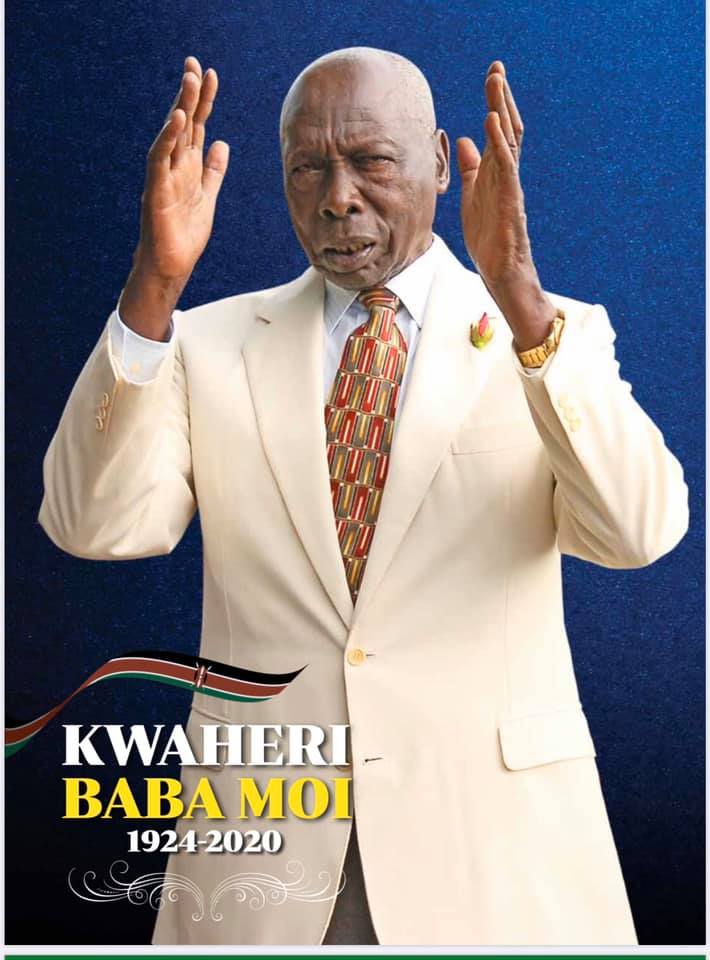As I watch close family and dignitaries eulogize the late Former President Daniel Toroitich Arap Moi at his solemn funeral, the following words by William Shakespeare are on my mind “All the world’s a stage. And all the men and women merely players. They have their exits and their entrances. And one man in his time, plays many parts. His act being seven ages…”
The late former President Moi no doubt made a loud and pompous entrance onto the world stage through politics and played many parts; key among the stage acts that I keenly watched included his role as husband, father, grandpa, teacher, Kenyan, politician, farmer, Christian, businessman, philanthropist, African statesman, dictator, democrat, president and retiree.
Baba Moi, as he was fondly referred to, in his different acts sometimes wowed me and I cheered loudly, at other times I was unhappy and I jeered as loudly as was admissible. Looking back, I now see that he was sometimes a brilliant actor, sometimes a really bad one and at times an average one.

Baba Moi, became my President when I was in lower primary. I vividly remember him taking on the country’s leadership. My mum’s transistor radio was at hand to usher and maintain him in our lives through the Voice of Kenya (VoK) news bulletins which always started with a patriotic song in praise of the late President and then proceeded to elaborate on his day’s directives and activities. As a young girl, the picture I had of Baba Moi was a humble yet stern, energetic, God fearing, all-knowing, larger-than-life and dedicated leader. My father followed current affairs keenly and he always took time to dissect latest news on Baba Moi with the adults around him. I took all the adult analysis in and made it my own with the patriotic songs cementing a larger-than-life image. In my early years, Baba Moi’s leadership seemed the greatest in the whole wide world with few doubts or questions.
When I joined Kenya High School, hot on the heels of the 1982 coup, the image I held of the President started to shift mainly because I was growing up and my character as a challenger was taking shape. My teen impression of Baba Moi was also shaped by the fact that Mrs. Ida Odinga was a much loved teacher in the school and her family’s tribulations were close home. During my years in high school, I perceived great injustice in the arrests of politicians, muzzling of media and dissenting voices as well as infiltration of system intelligence agents into academia. When I encountered Mrs. Odinga as my class teacher, her husband’s tribulations became personal. Our class sometimes sent group congratulatory cards to our beloved teacher when her husband was released only to be disheartened a few weeks/months later when he was rearrested leaving the then young mother struggling to take care of her young family on her own. While Mrs. Odinga always put on a brave face and never discussed the hardships she was going through, as her students however, we could feel and see the injustice of it all. Her sacking broke our hearts and most of us mumbled and grumbled away which was as close as we could get to questioning the system. I was personally angry and felt the unfairness of the system. During my teen years, the image of Moi shifted to perceive an unfair and undemocratic leader.
In University, I was politically alive with passionate opinions that were not in Baba Moi’s favor, but of course, by then I knew to keep contrary opinions to myself. The famous Mwakenya case was used to muzzle student activism and it sure served to ensure most of us students did not let anyone know of political dissenting thoughts, even in class debates. When the late Hon. Dr. Robert Ouko was murdered, many of us were very angry with the system. Fortunately, this was the time the clamor for multiparty reached a crescendo and the grisly murder of the former Minister only served to fuel the fire. I was personally excited about the fact that opposition figures were now bolder and could openly challenge Baba Moi, question his decisions and even tell him off. His efforts to arrest and hull some of the opposition figures into detention did not work as it previously used to. The dissenting voices had become too many, too loud and too bold. The West had joined the chorus, Foreign aid taps that previously flowed freely were turned off, structural adjustment programs (SAPs) were biting and the economy was on its knees.
As pressure piled on, I remember seeing another admirable side of Baba Moi. He put on his practical hat and made a bold about turn leading to the repeal of Section 2A of the constitution thus ushering in multiparty democracy. Expanded media was on a frenzy reporting the actual goings-on without negative consequences to journalists. The first FORD rally in 1990/1 felt like the country had reached Canaan. Despite the turn of events, vintage Baba Moi took it all in his stride, went back to the drawing board and as the professor of politics that he was, emerged with the real deal instant building bridges initiative with his erstwhile opponents. He was at the frontline of returning the country back to democracy and on his terms. Mzee Moi went on to run and win the 1992 and 1997 general elections under a multiparty dispensation making a graceful exit from the political stage in 2002. Though his opponents disputed his victories both times, the opposition had by then splintered and lost some credibility and goodwill from wananchi.
I vividly remember Mzee Moi’s last Jamhuri day speech in which he made a humble request for forgiveness from those he had wronged. I also recall the lonely figure he cut at Uhuru Park as his successor Former President Mwai Kibaki was sworn in and the helicopter that picked him from Statehouse Nairobi later in the day. The scenes of his last day in office were tear jerking but I felt gratified to witness what he had embodied come to an end. Mzee Moi faded from the public arena for me and I kind of forgot how he straddled the political landscape like a colossus. I occasionally caught a glimpse of him at my son’s former high school as patron but by and large he cut the figure of an ordinary citizen.
Too much water under the bridge now….. As I watch his farewell proceedings today, I am thankful that he lived long enough into retirement for me to appreciate that the acts and parts he played were really never about him. It was all about being human, making choices and being a leader in times and seasons. Mzee Moi lived long enough for some of his opponents to demonstrate through blunder and plunder that he was really never that bad a leader. Through his successors, I now have hindsight into the late Mzee Moi’s greatness, quality leadership, humility, humanity and statesmanship. He was as graceful in retirement as he was when in the limelight. It is gratifying to watch the last act of Mzee Moi as he exits the world stage with pomp and color much the same way he lived. FareTheeWellBabaMoi #RestWellMzeeMoi #AllTheWorldIsAStage
